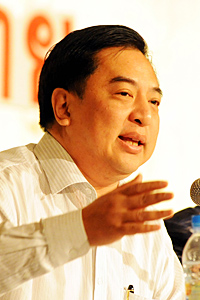
The week before last, the government renewed its reconciliation efforts. This time, it set up a new committee under the leadership of Deputy Prime Minister and Defence Minister Prawit Wongsuwon.
The aim is to bring conflicting parties together to seek solutions, especially politicians from the two opposing parties, Democrat and Pheu Thai, and their allies, the former People's Democratic Reform Committee led by Suthep Thaugsuban and the red-shirt United Front for Democracy against Dictatorship.
But reconciliation for the regime means the public must accept the terms they set.
Since staging the coup in 2014, the National Council for Peace and Order (NCPO) has maintained strong support from the elite, technocrats and businesses. In order to sustain and expand its base, the NCPO realised it would have to compromise with the political class.

Suranand Vejjajiva was secretary-general to the prime minister during the Yingluck Shinawatra government and is now a political analyst.
The speculation is that there will also be behind-the-scenes negotiations with Thaksin Shinawatra, the ousted premier who has lived in self-imposed exile abroad. Since Thaksin has not yet served his sentence in a corruption case verdict handed down by the Supreme Court, Prime Minster Prayut Chan-o-cha has ruled out an amnesty for Thaksin. But this does not mean some kind of deal could not be struck.
Across the political spectrum, there are court cases of various sorts involving some members of the conflicting parties, from treason to defamation. For now, any type of amnesty seems to be off the table during this so-called reconciliation process.
If the government's initiative works, it will only bring about a short-term truce with the political class. Peace, however, will not be sustainable since this effort does not seem to address the root cause of the conflict.
To make reconciliation work, the regime must consider several issues.
First, those found guilty of causing deaths and injuries during previous political crackdowns must be bought to justice, or closure for families and friends of the dead will never happen. Wounds will never heal. And society will not move ahead with confidence in the rule of law, thus planting the seeds of more conflicts which could be more violent.
A combination of truth, justice and a social contract, that is accountable to the rule of law, would form a strong foundation for reconciliation.
Second, the root cause of the conflict is not Thaksin's ego or ambition alone. Thaksin's message since he set up his Thai Rak Thai Party was hope and opportunities for the new middle class in rural areas. He promised his rural political supporters they could dream of wealth through hard work without seeing it taken away by their Bangkok counterparts. Under the previous centralised governance system, Bangkok reaped the benefits at the cost of provincial areas for a very long time.
The current regime has not discussed decentralisation of power or a return of some form of democracy, even at the local level. There has been neither talk of elected provincial and Bangkok governors nor elected local councillors, even though these elected representatives could act as a checks-and-balance mechanism against the increasing power of appointed provincial governors.
Gen Prayut may have condemned populist policies implemented by previous governments. His government, however, has adopted similar measures. But the ruling regime cannot overlook the fact that people cannot simply be silenced by welfare handouts. If the gap between the rich and the poor remains while the privileged few continue to benefit, the poor will come knocking on the regime's door once the time is ripe and their conditions are unbearable.
Third, as long as the government relies on its one-sided approach to force feed the public political ideas, reconciliation will be hard to come by. The regime has tried to show that it takes the high moral ground in order to claim legitimacy to rule and advance its agenda. But this is both patronage and patronising. All military governments have this mindset, thinking they know better than the ignorant masses. They regard themselves as the ones who have the right to interpret laws and apply them accordingly.
It has been proven that public hearings organised by the current regime during the drafting of the constitution and its organic laws were merely ways for it to lecture the public rather than listen to them. It will likely be the same for its latest reconciliation attempt.
The best way is for the regime to start a committed programme of civic education as a basis for bringing people together. Unity and reconciliation can occur when the lingering doubts are resolved and the masses feel they are part of the process. And it is only through a democratic process that allows all stakeholders to participate and voice their concerns that the country can make progress.
Such a notion is not the intention of the regime which will soon send out invitations to politicians and other groups to participate in meetings it will organise and make them follow the terms it puts on the table.
Sadly, it is likely that politicians will succumb to the initiative and join the fray. It is not the interests of the people that these politicians have in mind, but their own self-interest to get back in the political game.
